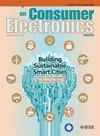Empowering Consumer Healthcare Through Sensor-Rich Devices Using Federated Learning for Secure Resource Recommendation
IF 4.3
2区 计算机科学
Q1 ENGINEERING, ELECTRICAL & ELECTRONIC
引用次数: 0
Abstract
When implementing zero-trust edge computing, offloading computational tasks and data access through traditional model training and usage approaches can lead to increased latency. Since the traditional methods often involve extensive communication with a central server, creating additional network hopping stations/nodes resulting in increased latency. The challenge is bound to allocate a befitting resource at a given consumer demand. In this proposed system, a federated learning model based data offloading and consumer medical resource recommendation of IoT is discussed and validated. The user/consumer group and local training models are aligned with edge servers for data preprocessing and customization with a series of resources demand creation and coordination. The consumer resource allocating priorities are fine-grained with the proposed blockchain based priority analyzer for recommendation and allocation. The computational parameter such as resource pool, average waiting time, energy consumption and transmission trust delays are observed and validated. The proposed framework fetches consumer resources logs and synchronizes the centralized training model for effective scheduling and allocation of resources with an accuracy of 94.92% under the 5G operating spectrum. The technique has demonstrated minimal latency in offloading the data request demand and resource allocation at the cloud servers.通过使用联邦学习进行安全资源推荐的富传感器设备增强消费者医疗保健能力
在实施零信任边缘计算时,通过传统的模型训练和使用方法卸载计算任务和数据访问可能会导致延迟增加。由于传统方法通常涉及与中央服务器的广泛通信,因此创建额外的网络跳变站/节点会导致延迟增加。挑战必然是在给定的消费者需求下分配合适的资源。在该系统中,讨论并验证了基于物联网数据卸载和消费者医疗资源推荐的联邦学习模型。用户/消费者群体和本地培训模型与边缘服务器对齐,用于数据预处理和定制,并具有一系列资源需求创建和协调。消费者资源分配优先级是细粒度的,建议使用基于区块链的优先级分析器进行推荐和分配。对资源池、平均等待时间、能量消耗和传输信任延迟等计算参数进行了观察和验证。该框架提取消费者资源日志,同步集中训练模型,实现资源的有效调度和分配,在5G运行频谱下,准确率达到94.92%。该技术已经证明了在云服务器上卸载数据请求需求和资源分配的最小延迟。
本文章由计算机程序翻译,如有差异,请以英文原文为准。
求助全文
约1分钟内获得全文
求助全文
来源期刊
CiteScore
7.70
自引率
9.30%
发文量
59
审稿时长
3.3 months
期刊介绍:
The main focus for the IEEE Transactions on Consumer Electronics is the engineering and research aspects of the theory, design, construction, manufacture or end use of mass market electronics, systems, software and services for consumers.

 求助内容:
求助内容: 应助结果提醒方式:
应助结果提醒方式:


